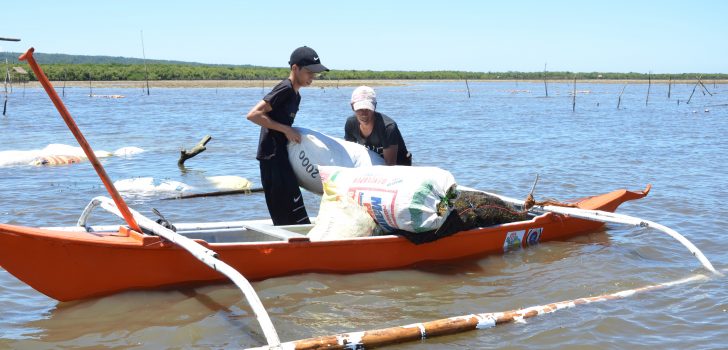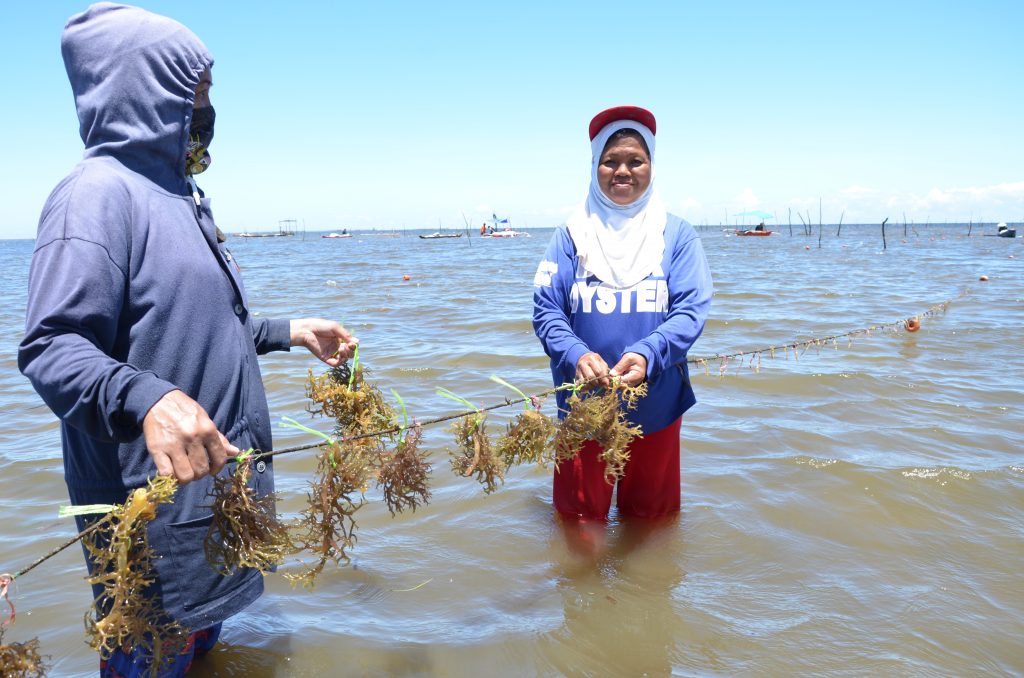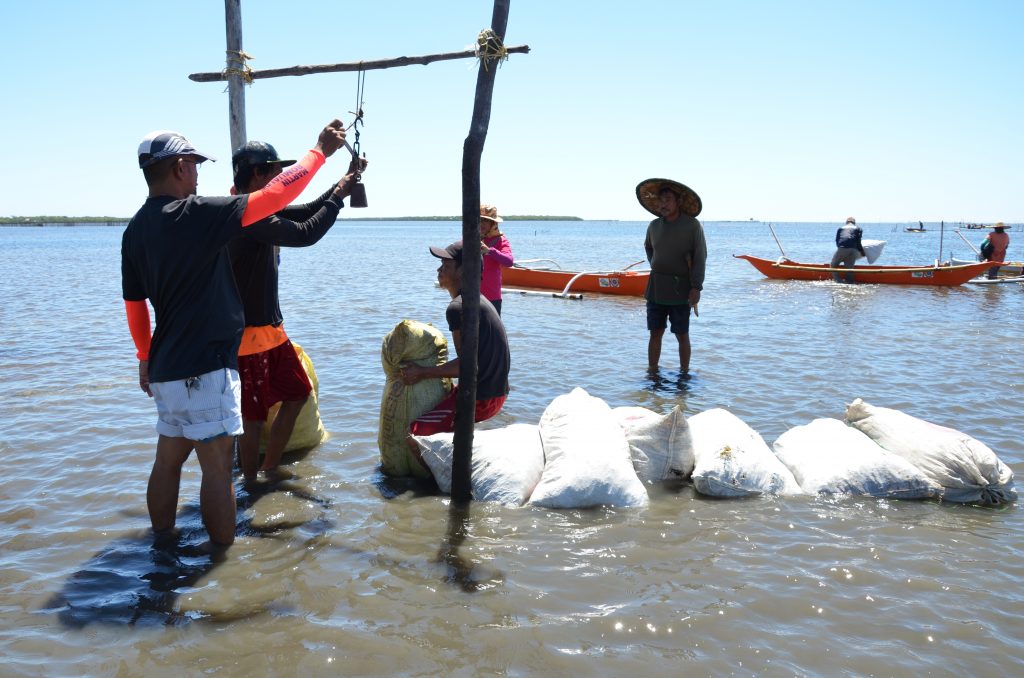 Seaweed farmers transport harvested seaweeds using PRDP non-motorized fiberglass boat delivered to Carayat Seaweed Farmers Association on July 3, 2017. (Photo by Hermito Antonio Privaldos, DA-PRDP RPCO V InfoACE Unit)
Seaweed farmers transport harvested seaweeds using PRDP non-motorized fiberglass boat delivered to Carayat Seaweed Farmers Association on July 3, 2017. (Photo by Hermito Antonio Privaldos, DA-PRDP RPCO V InfoACE Unit) PRDP microenterprise subproject boosts seaweed farmers’ income, unifies co-op
PRIETO DIAZ, SORSOGON – Fifty-three-year-old Susana Perol of Brgy. Carayat, Prieto Diaz, Sorsogon enthusiastically ties seaweed propagules to a polyethylene rope while listening to her transistor radio at the Carayat Seaweed Farmers Association’s (CSFA’s) 4.35-hectare seaweed area about 300 meters away from the seashore.
A member of the cooperative for three years, she came early to work today to harvest seaweeds and plant seaweed propagules for the next cropping period. Listening to music keeps her alert while doing her job. Perol was among the CSFA members who now use the 10 non-motorized fiberglass boats delivered to the cooperative on July 3, 2017.
“Noong una wala akong sariling bangka, naglalakad, nagtitiyaga para magkaroon ng kabuhayan. Hindi ako tumigil kasi maganda ang pagtatanim ng seaweeds, tiyaga at pagod lang talaga. Malaking tulong ’yong bangka kasi nagamit ko ’yon para i-monitor ko ’yong tanim kong seaweeds. Hindi na kami nahihirapan maglakad (I used to walk and work patiently to earn a living. I didn’t stop because seaweed farming is a good source of income. It just requires a lot of hard work. The boats were of big help because I was able to use one of them in monitoring my seaweed farm),” Perol said.
Perol started harvesting seaweeds at 6:30 a.m. together with her sister, Josefa. At 1 p.m. they already gathered about 4,885 kilograms of seaweeds which the cooperative will buy for P25 per kilogram as stipulated in their supply contract agreement. Perol will get P20 per kilogram while P5 will go to the cooperative’s savings.

Carayat Seaweed Farmers Association member Susana Perol (right) and her sister, Josefa plant seaweed propagules in her 2,500 square-meter seaweed area. (Photo by Hermito Antonio Privaldos, DA-PRDP RPCO V InfoACE Unit)
Under the Community Force Account Goods Contract of the Philippine Rural Development Project (PRDP), beneficiaries or proponent group members can supply the required goods costing less than USD50,000 or P2.55 million in accordance with the Enterprise Investment Agreement and consistent with the Enterprise Subproject Procurement Plan.
“Malaking tulong sa amin kasi ’yong dati na binibenta namin na dried seaweeds, matagal ang proseso. Ngayon hindi na kami nahihirapan na i-dry ang gulaman namin. Hindi ko inaaasahan na ganito kataas ang kita. Tiyaga lang tapos araw-araw na monitoring (It’s a great help to us because selling dried seaweeds take a long process. Now, we don’t have to struggle in drying our seaweeds. I didn’t expect that the income would be this high. All it takes is patience in monitoring the seaweeds every day),” Perol added.
According to Esteven Garcia, enterprise development (I-REAP) component staff of the Provincial Project Management and Implementation Unit (PPMIU) of Sorsogon, the supply contract agreement simplifies the procurement process.
“Ang kagandahan sa supply agreement, isang tao lang kausap, hindi magulo. Sa seaweeds hindi masyadong mahirap ang supply contract agreement kasi contiguous ang area, ang supply nasa isang lugar lang. Mabilis ang benefit kasi mabilis ang transaction compared sa ibang procurement methods ng government (An advantage of supply agreement is that it is more orderly. You only transact with one person. In terms of seaweed production, supply contract agreement is easier because of the contiguous area. Benefits come fast because transaction is also faster compared with other government procurement methods),” Garcia said.
The P1.25 million-worth Carayat Seaweeds Production and Marketing microenterprise subproject consists of 10 modules that require 25,000 kilograms of seaweed propagules. Three members of the CSFA will take charge of each module’s maintenance. The cooperative will also venture in selling raw dried seaweeds for P35 per kilogram. Each module can produce 54.57 bags or 2,700 kilograms of raw dried seaweeds per cropping.
CSFA Chairperson Candelaria Esplana shared how the microenterprise subproject unifies the cooperative and increases the farmer-members’ incomes.
“Dati may nangingialam sa tanim ng may tanim. Ayaw mag-miyembro. Ngayon, sumali na sila, nadagdagan ang mga miyembro. Sa bawat meeting, alam ng bawat isa ang mga programang kailangang gawin. Sa tuwing magtatanim at magha-harvest, tulong-tulong sila, walang isipan (Before, there were some who meddle with others’ seaweed farms but they didn’t want to join our cooperative. Now, our membership increased because they already signified their intent to participate in our activities. In every meeting, each member is informed about the programs. They help each other in planting and harvesting),” Esplana said.
Aside from seaweed production, CSFA members gain additional income by fishing with the use of their non-motorized fiberglass boats. CSFA’s 29 members are seaweed farmers and fisherfolk who earn an average monthly income of P1,500 to P1,800. With the production materials and equipment from PRDP, the members’ monthly income is projected to rise by 70 to 78 percent or P3,536.08 to P3,885.57.

Carayat Seaweed Farmers Association members weigh the sacks of seaweeds to be purchased by the cooperative under PRDP’s supply contract agreement mode of procurement. (Photo by Hermito Antonio Privaldos, DA-PRDP RPCO V InfoACE Unit)
The sea level is now above her knees and a few hours more, it will be high tide. But the waves do not threaten Perol. Knowing her role in the success of the CSFA’s microenterprise, she was more empowered and inspired to pursue seaweed production.
“Kailangan ang pagkakaisa at pagtutulungan gaya ngayon, para umunlad ang organisasyon. Pag maganda ang tubo ng gulaman, makikita mo talaga parang ayaw mo nang umalis dito (Unity and cooperation are needed, just like what we are doing now to guarantee our organization’s progress. Seeing seaweeds’ productivity inspires us to linger here),” she added.
Prieto Diaz is one of the municipalities in Sorsogon which was hardly hit by Typhoon Nona in December 2015. The typhoon damaged many of the fishermen and seaweed farmers’ properties including their houses and boats. The calamity challenged CSFA members to restore their source of livelihood. The Carayat Seaweeds Production and Marketing microenterprise subproject is one of the 10 PRDP-approved microenterprise subprojects for calamity stricken areas in the province.
PRDP is a six-year World Bank-assisted national project under the Department of Agriculture that aims to establish a modern, value chain-oriented, and climate-resilient agri-fishery sector in the countryside. ### (Annielyn L. Baleza, DA-PRDP RPCO V InfoACE Unit)
